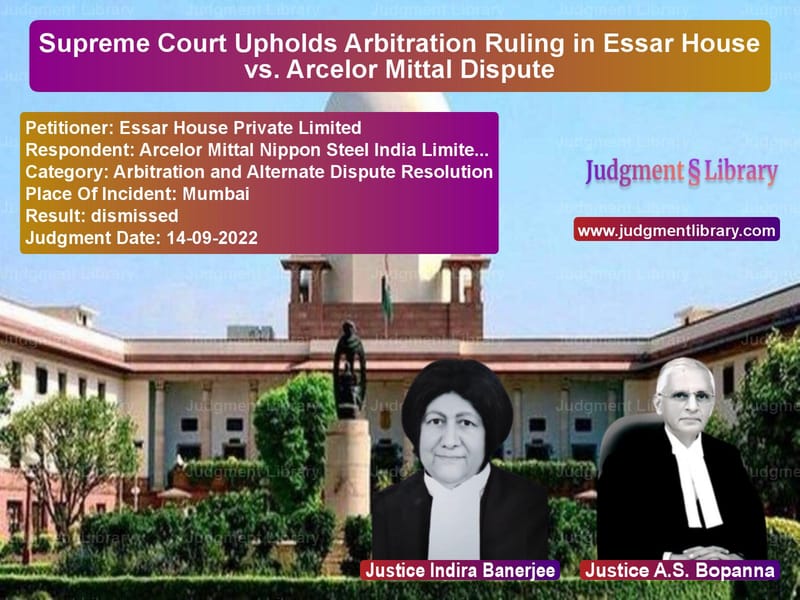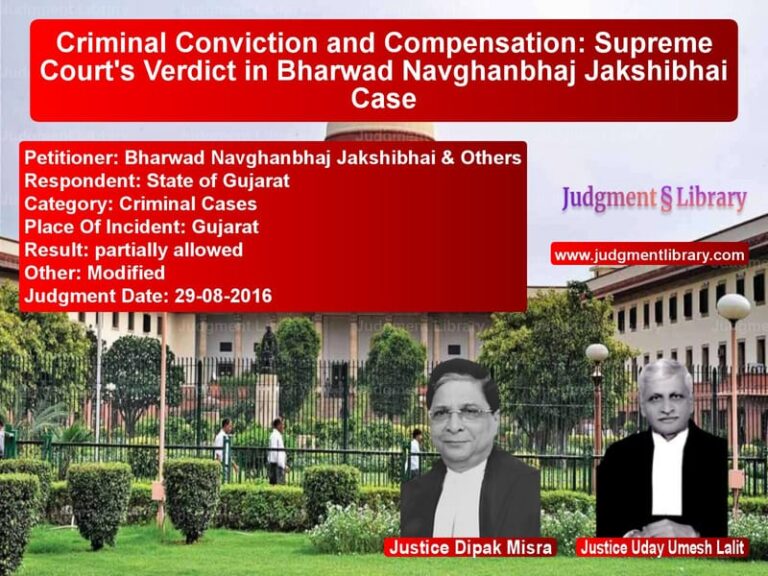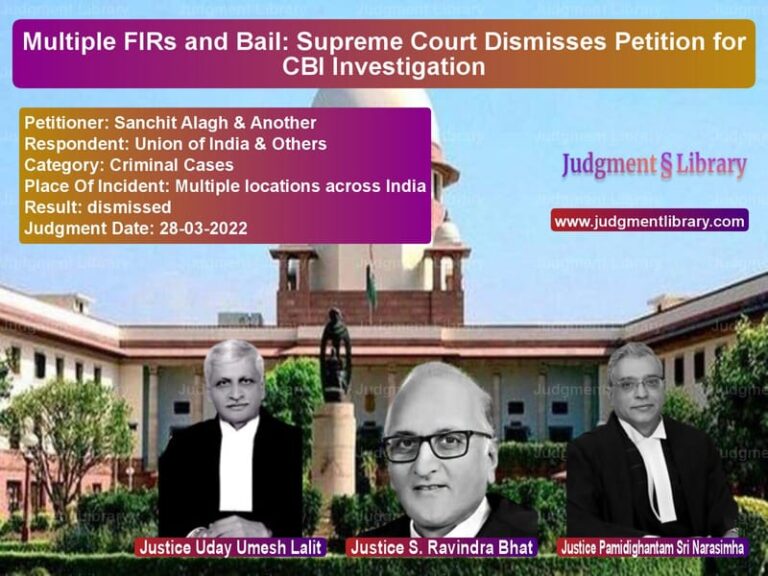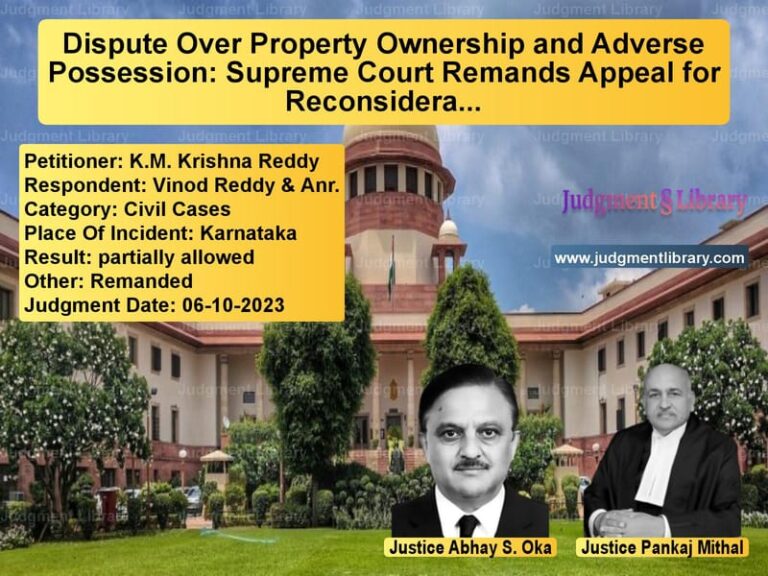Supreme Court Upholds Arbitration Ruling in Essar House vs. Arcelor Mittal Dispute
The Supreme Court of India has delivered a crucial judgment in the case of Essar House Private Limited vs. Arcelor Mittal Nippon Steel India Limited, addressing disputes related to financial transactions and arbitration. The Court upheld the Bombay High Court’s decision directing Essar House Private Limited and Essar Services India Private Limited to deposit substantial amounts in connection with security deposits owed to Arcelor Mittal Nippon Steel India Limited (Arcellor). The ruling reaffirms the principles governing interim relief under Section 9 of the Arbitration and Conciliation Act, 1996.
Background of the Case
The case arose from financial disputes between Essar House Private Limited (EHPL) and Arcelor Mittal Nippon Steel India Limited (Arcellor), following the resolution process of Essar Steel India Limited (ESIL). The conflict involved security deposits related to rental agreements, business center agreements, and financial transactions that took place before Arcellor acquired Essar Steel through an insolvency resolution process.
Essar House Private and Essar Services were directed by the Bombay High Court to deposit security amounts—Rs. 35.5 crores and Rs. 47.41 crores respectively—with the court to secure claims by Arcellor. The companies challenged this order before the Supreme Court.
Legal Proceedings
Arguments by Essar House and Essar Services
- The appellants contended that no amount was due to Arcellor and that the security deposits were adjusted against debts owed by Essar Steel.
- They argued that funds had been transferred or assigned to third parties, thereby extinguishing their liability towards Arcellor.
- It was claimed that the High Court had ignored the principles under Order 38 Rule 5 of the Civil Procedure Code (CPC), which governs attachment before judgment.
- The petitioners relied on the Supreme Court ruling in Raman Tech. & Process Engg. Co. vs. Solanki Traders, asserting that interim relief under Section 9 should not be granted unless there is clear evidence that the respondent intends to dispose of assets to evade obligations.
Arguments by Arcelor Mittal
- Arcellor argued that the security deposits were contractually refundable and could not be unilaterally set off against debts.
- The defense of assignment to third parties was a sham, and no evidence had been produced to show a valid transfer.
- The company relied on the Supreme Court’s ruling in Citibank N.A. vs. Standard Chartered Bank, emphasizing that contract novation requires mutual consent and cannot be done unilaterally.
- It was asserted that the Bombay High Court correctly secured the claim under Section 9 to protect Arcellor’s interests pending arbitration.
Supreme Court’s Observations
The Supreme Court, led by Justice Indira Banerjee and Justice A.S. Bopanna, reviewed the case and made the following key observations:
1. The Need for Interim Relief
The Court emphasized that Section 9 of the Arbitration Act allows courts to grant interim relief to protect the subject matter of arbitration. The Court stated:
“Proof of actual attempts to deal with, remove, or dispose of the property with a view to defeat an impending arbitral award is not imperative for the grant of relief under Section 9.”
2. Security Deposits Are Refundable
The Court found that the security deposits made by Essar Steel to Essar House Private and Essar Services were refundable in nature, and Arcellor had a prima facie right to claim them.
3. Assignment and Novation Require Mutual Consent
The Court held that obligations under a contract cannot be assigned or novated without the consent of the counterparty, citing Khardah Company Ltd. vs. Raymon & Co. (India) Pvt. Ltd.
4. The High Court’s Decision Was Justified
The Supreme Court upheld the Bombay High Court’s ruling, emphasizing that:
- The appellants had failed to provide documentary evidence supporting their claim that the security deposits had been transferred or adjusted.
- Interim relief under Section 9 of the Arbitration Act does not require strict adherence to Order 38 Rule 5 CPC, provided there is a strong prima facie case.
- The High Court was justified in directing Essar House and Essar Services to deposit the disputed amounts to secure Arcellor’s claim.
Final Verdict
The Supreme Court dismissed the appeals and ruled as follows:
- Essar House Private Limited must deposit Rs. 35.5 crores with the Bombay High Court.
- Essar Services India Private Limited must deposit Rs. 47.41 crores.
- Their claim that the security deposits had been extinguished was rejected.
- The orders of the Bombay High Court were affirmed.
Impact of the Judgment
This judgment has significant implications for arbitration and commercial transactions:
- It reaffirms that courts can grant interim relief under Section 9 of the Arbitration Act without requiring strict adherence to CPC provisions.
- Companies must ensure that assignments or novations of financial liabilities are backed by valid agreements and mutual consent.
- The ruling strengthens the enforceability of refundable security deposits in commercial contracts.
Conclusion
The Supreme Court’s ruling in Essar House vs. Arcelor Mittal underscores the importance of adhering to contractual obligations and ensures that security deposits are not arbitrarily withheld. By upholding the High Court’s order, the judgment reinforces the power of courts to provide interim protection under arbitration law, ensuring that claimants are not left remediless pending dispute resolution.
Read also: https://judgmentlibrary.com/supreme-court-orders-arbitration-in-sikkim-hotel-lease-dispute/
Petitioner Name: Essar House Private Limited.Respondent Name: Arcelor Mittal Nippon Steel India Limited.Judgment By: Justice Indira Banerjee, Justice A.S. Bopanna.Place Of Incident: Mumbai.Judgment Date: 14-09-2022.
Don’t miss out on the full details! Download the complete judgment in PDF format below and gain valuable insights instantly!
Download Judgment: essar-house-private-vs-arcelor-mittal-nippo-supreme-court-of-india-judgment-dated-14-09-2022.pdf
Directly Download Judgment: Directly download this Judgment
See all petitions in Arbitration Awards
See all petitions in Dispute Resolution Mechanisms
See all petitions in Enforcement of Awards
See all petitions in Judgment by Indira Banerjee
See all petitions in Judgment by A. S. Bopanna
See all petitions in dismissed
See all petitions in supreme court of India judgments September 2022
See all petitions in 2022 judgments
See all posts in Arbitration and Alternate Dispute Resolution Category
See all allowed petitions in Arbitration and Alternate Dispute Resolution Category
See all Dismissed petitions in Arbitration and Alternate Dispute Resolution Category
See all partially allowed petitions in Arbitration and Alternate Dispute Resolution Category







